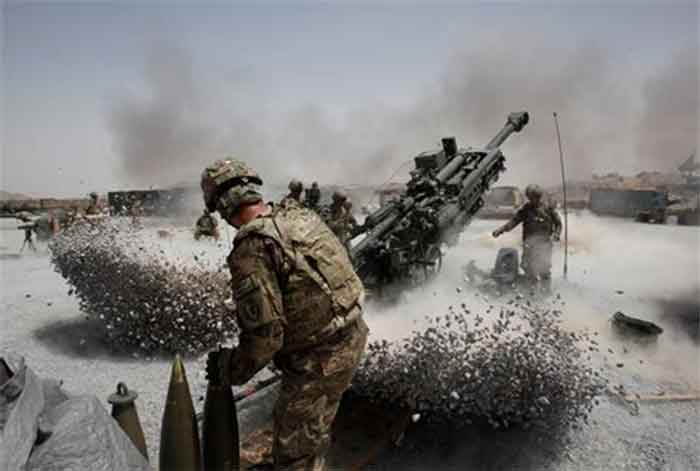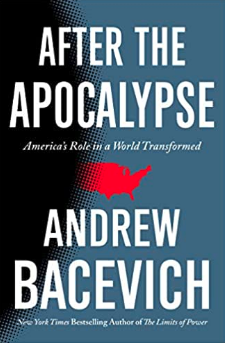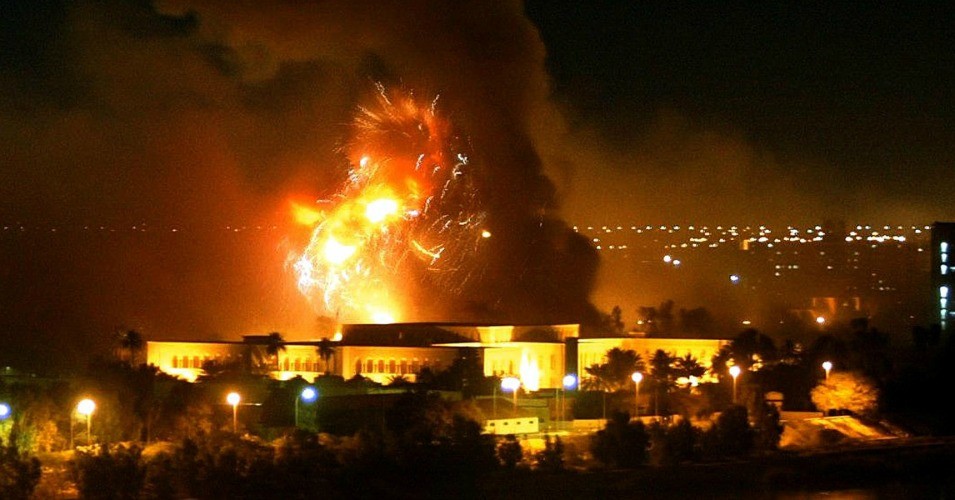
“Ours is the cause of freedom.
We’ve defeated freedom’s enemies before, and we will defeat them again…
[W]e know our cause is just and our ultimate victory is assured…
My fellow Americans, let’s roll.”
— George W. Bush, November 8, 2001
In the immediate wake of 9/11, it fell to President George W. Bush to explain to his fellow citizens what had occurred and frame the nation’s response to that singular catastrophe. Bush fulfilled that duty by inaugurating the Global War on Terror, or GWOT. Both in terms of what was at stake and what the United States intended to do, the president explicitly compared that new conflict to the defining struggles of the twentieth century. However great the sacrifices and exertions that awaited, one thing was certain: the GWOT would ensure the triumph of freedom, as had World War II and the Cold War. It would also affirm American global primacy and the superiority of the American way of life.
The twentieth anniversary of the terrorist attack on the World Trade Center and the Pentagon now approaches. On September 11, 2021, Americans will mark the occasion with solemn remembrances, perhaps even setting aside, at least momentarily, the various trials that, in recent years, have beset the nation.
Twenty years to the minute after the first hijacked airliner slammed into the North Tower of the World Trade Center, bells will toll. In the ensuing hours, officials will lay wreathes and make predictable speeches. Priests, rabbis, and imams will recite prayers. Columnists and TV commentators will pontificate. If only for a moment, the nation will come together.
It’s less likely that the occasion will prompt Americans to reflect on the sequence of military campaigns over the two decades that followed 9/11. This is unfortunate. Although barely noticed, those campaigns — the term GWOT long ago fell out of favor — give every sign of finally winding down, ending not with a promised victory but with something more like a shrug. On that score, the Afghanistan War serves as Exhibit A.
President Bush’s assurances of ultimate triumph now seem almost quaint — the equivalent of pretending that the American Century remains alive and well by waving a foam finger and chanting “We’re number one!” In Washington, the sleeping dog of military failure snoozes undisturbed. Senior field commanders long ago gave up on expectations of vanquishing the enemy.
While politicians ceaselessly proclaim their admiration for “the troops,” in a rare show of bipartisanship they steer clear of actually inquiring about what U.S. forces have achieved and at what cost. As for distracted and beleaguered ordinary Americans, they have more pressing things to worry about than distant wars that never panned out as promised.
Into the Graveyard of Empires
In his January 2001 farewell address, welcoming the dawn of the Third Millennium, President Bill Clinton asserted with sublime assurance that, during his eight years in office, the United States had completed its “passage into the global information age, an era of great American renewal.” In fact, that new century would bring not renewal but a cascade of crises that have left the average citizen reeling.
First came 9/11 itself, demolishing assurances that history had rendered a decisive verdict in America’s favor. The several wars that followed were alike in this sense: once begun, they dragged on and on. More or less contemporaneously, the “rise” of China seemingly signaled that a centuries-old era of Western global dominion was ending. After all, while the United States was expending vast sums on futile military endeavors, the People’s Republic was accumulating global market share at a striking rate. Meanwhile, on the domestic front, a populist backlash against neoliberal and postmodern nostrums vaulted an incompetent demagogue into the White House.
As the worst pandemic in a century then swept across the planet, killing more Americans than died fighting World War II, the nation’s chosen leader dithered and dissembled, depicting himself as the real victim of the crisis. Astonishingly, that bogus claim found favor with tens of millions of voters. In a desperate attempt to keep their hero in office for another four (or more) years, the president’s most avid supporters mounted a violent effort to overturn the constitutional order. Add to the mix recurring economic cataclysms and worries about the implications of climate change and Americans have good reason to feel punch drunk.
It’s hardly surprising that they have little bandwidth left for reflecting on the war in Afghanistan as it enters what may be its final phase. After all, overlapping with the more violent and costly occupation of Iraq, the conflict in Afghanistan never possessed a clear narrative arc. Lacking dramatic duels or decisive battles, it was the military equivalent of white noise, droning in the background all but unnoticed. Sheer endlessness emerged as its defining characteristic.
The second President Bush launched the Afghan War less than a month after 9/11. Despite what seemed like a promising start, he all but abandoned that effort in his haste to pursue bigger prey, namely Saddam Hussein. In 2009, Barack Obama inherited that by-now-stalemated Afghan conflict and vowed to win and get out. He would do neither. Succeeding Obama in 2017, Donald Trump doubled down on the promise to end the war completely, only to come up short himself.
Now, taking up where Trump left off, Joe Biden has signaled his desire to ring down the curtain on America’s longest-ever armed conflict and so succeed where his three immediate predecessors failed. Doing so won’t be easy. As the war dragged on, it accumulated complications, both within Afghanistan and regionally. The situation remains fraught with potential snags.
While in office, Trump committed to a complete withdrawal of U.S. troops from Afghanistan by May 1st of this year. Although Biden recently acknowledged that meeting such a deadline would be “tough,” he also promised that any further delay will extend no more than a few months. So it appears increasingly likely that a conclusion of some sort may finally be in the offing. Prospects for a happy ending, however, range between slim and nonexistent.
One thing seems clear: whether Washington’s ongoing efforts to broker a peace deal between the Taliban and the Afghan government succeed, or whether the warring parties opt to continue fighting, time is running out on the U.S. military mission there. In Washington, the will to win is long gone, while patience with the side we profess to support wastes away and determination to achieve the minimalist goal of avoiding outright defeat is fading fast. Accustomed to seeing itself as history’s author, the United States finds itself in the position of a supplicant, hoping to salvage some tiny sliver of grace.
What then does this longest war in our history signify? Even if the issue isn’t one that Americans now view as particularly urgent, at least a preliminary answer seems in order, if only because the U.S. troops who served there — more than three-quarters of a million in all — deserve one.
And there’s also this: A war that drags on inconclusively for 20 years is not like a ballgame that goes into extra innings. It’s a failure of the first order that those who govern and those who are governed should face squarely. To simply walk away, as Americans may be tempted to do, would be worse than irresponsible. It would be obscene.
A Fresh Bite of a Poisonous Imperial Apple
Assessing the significance of Afghanistan requires placing it in a larger context. As the first war of the post-9/11 era, it represents a particularly instructive example of imperialism packaged as uplift.
The European powers of the nineteenth and early twentieth centuries pioneered a line of self-regarding propaganda that imparted a moral gloss to their colonial exploitation throughout much of Asia and Africa. When the United States invaded and occupied Cuba in 1898 and soon after annexed the entire Philippine archipelago, its leaders devised similar justifications for their self-aggrandizing actions.
The aim of the American project in the Philippines, for example, was “benevolent assimilation,” with Filipino submission promising eventual redemption. The proconsuls and colonial administrators Washington dispatched to implement that project may even have believed those premises. The recipients of such benefactions, however, tended to be unpersuaded. As Filipino leader Manuel Quezon famously put it, “Better a government run like hell by the Filipinos than one run like heaven by the Americans.” A patriotic nationalist, Quezon preferred to take his chances with self-determination, as did many other Filipinos unimpressed with American professions of benign intentions.
This gets to the core of the problem, which remains relevant to the U.S. occupation of Afghanistan in the present century. In 2001, American invaders arrived in that country bearing a gift labeled “Enduring Freedom” — an updated version of benign assimilation — only to find that substantial numbers of Afghans had their own ideas about the nature of freedom or refused to countenance infidels telling them how to run their affairs. Certainly, efforts to disguise Washington’s imperial purposes by installing Hamid Karzai, a photogenic, English-speaking Afghan, as the nominal head of a nominally sovereign government in Kabul fooled almost no one. And once Karzai, the West’s chosen agent, himself turned against the entire project, the jig should have been up.
The U.S. war in Afghanistan has to date claimed the lives of more than 2,300 U.S. troops, while wounding another 20,000. Staggeringly larger numbers of Afghans have been killed, injured, or displaced. The total cost of that American war long ago exceeded $2 trillion. Yet, as documented by the “Afghanistan Papers” published last year by the Washington Post, the United States and its allies haven’t defeated the Taliban, created competent Afghan security forces, or put in place a state apparatus with the capacity to govern effectively. Despite almost 20 years of effort, they haven’t come close. Neither have the U.S. and its NATO coalition partners persuaded the majority of Afghans to embrace the West’s vision of a suitable political order. When it comes to the minimum preconditions for mission accomplishment, in other words, the United States and its allies are batting 0 for 4.
Intensive and highly publicized American attempts to curb Afghan corruption have failed abysmally. So, too, have well-funded efforts to reduce opium production. With the former a precondition for effective governance and the latter essential to achieving some semblance of aboveboard economic viability, make that 0 for 6, even as the momentum of events at this moment distinctly favors the Taliban. With 75% of government revenues coming from foreign donors, the Islamic Republic of Afghanistan is effectively on the international dole and has no prospect of becoming self-sufficient anytime soon.
Whether the U.S.-led effort to align Afghanistan with Western values was doomed from the start is impossible to say. At the very least, however, that effort was informed by remarkable naïveté. Assessing the war a decade ago — 10 years after it began — General Stanley McChrystal, former commander of all coalition forces there, lamented that “we didn’t know enough and we still don’t know enough” about Afghanistan and its people. “Most of us — me included — had a very superficial understanding of the situation and history, and we had a frighteningly simplistic view of recent history, the last 50 years.” Implicit in that seemingly candid admission is the suggestion that knowing more would have yielded a better outcome, that Afghanistan should have been “winnable.”
For the thwarted but unreconstructed imperialist, consider this the last line of retreat: success could have been ours if only decision makers had done things differently. Anyone familiar with the should-have-beens trotted out following the Vietnam War in the previous century — the U.S. should have bombed more (or less), invaded the North, done more to win hearts-and-minds, etc. — will recognize those claims for what they are: dodges. As with Vietnam, to apply this if-only line of reasoning to Afghanistan is to miss that war’s actual significance.
Minor War, Major Implications
As American wars go, Afghanistan ranks as a minor one. Yet this relatively small but very long conflict stands at the center of a distinctive and deeply problematic era in American history that dates from the end of the Cold War some 40 years ago. Two convictions defined that era. According to the first, by 1991 the United States had achieved something akin to unquestioned global military supremacy. Once the Soviets left the playing field, no opponent worthy of the name remained. That appeared self-evident.
According to the second conviction, circumstances now allowed — even cried out for — putting the U.S. military to work. Reticence, whether defined as deterrence, defense, or containment, was for wusses. In Washington, the temptation to employ armed force to overthrow “evil” became irresistible. Not so incidentally, periodic demonstrations of U.S. military might would also warn potential competitors against even contemplating a challenge to American global primacy.
Lurking in the background was this seldom acknowledged conviction: in a world chockablock full of impoverished, ineptly led nations, most inhabited by people implicitly classified as backward, someone needed to take charge, enforce discipline, and provide at least a modicum of decency. That the United States alone possessed the power and magnanimity to play such a role was taken for granted. After all, who was left to say nay?
So, with the passing of the Cold War, a new chapter in the history of American imperialism commenced, even if in policy circles that I-word was strictly verboten. Among the preferred euphemisms, humanitarian intervention, sometimes justified by a recently discovered “responsibility to protect,” found particular favor. But this was mostly theater, an updating of Philippine-style benevolent assimilation designed to mollify twenty-first-century sensibilities.
In actual practice, it fell to the president of the United States, commonly and without irony referred to as “the most powerful man in the world,” to decide where U.S. bombs were to fall and U.S. troops arrive. When American forces flexed their muscles in faraway places, ranging from Panama, Iraq, Somalia, Haiti, Bosnia, Kosovo, Serbia, Afghanistan, Sudan, and the Philippines to Afghanistan (again), Iraq (again), Libya, various West African countries, Somalia (again), Iraq (for a third time), or Syria, authorization by the United Nations Security Council or Congress ranked as somewhere between incidental and unnecessary. For military actions that ranged from full-scale invasions to assassinations to a mere show of force, whatever justification the “leader of the Free World” chose to offer was deemed sufficient.
Military action undertaken at the behest of the commander-in-chief became the unspoken but definitive expression of American global leadership. That Bush the father, Clinton, Bush the son, Obama, and Trump would all wield extra-constitutional authority to — so the justification went — advance the cause of peace and freedom worldwide only testified to the singularity of the United States. In this way, an imperial presidency went hand-in-hand with imperial responsibilities and prerogatives.
At first imperceptibly, but more overtly with the passage of time, military adventurism undertaken by imperial presidents fostered a pattern of hypocrisy, dishonesty, cynicism, waste, brutality, and malaise that have today become pervasive. In certain quarters, the tendency persists to blame former President Trump for just about everything that ails this nation, including racism, sexism, inequality, public-health crises, and the coarsening of public discourse, not to speak of inattention to environmental degradation and our crumbling infrastructure. Without letting him off the hook, let me suggest that Washington’s post-Cold War imperial turn contributed more to our present discontent and disarray than anything Trump did in his four years in the White House.
On that score, the Afghan War made a pivotal and particularly mournful contribution, definitively exposing as delusionary claims of U.S. military supremacy. Even in late 2001, only weeks after President George W. Bush had promised “ultimate victory,” the war there had already gone off script. From early on, in other words, there was unmistakable evidence that military activism pursuant to neo-imperial ambitions entailed considerable risk, while exacting costs far outweighing any plausible benefits.
The longest war in U.S. history should by now have led Americans to reflect on the consequences that stem from succumbing to imperial temptations in a world where empire has long since become obsolete. Some might insist that present-day Americans have imbibed that lesson. In Washington, hawks appear chastened, with few calling for President Biden to dispatch U.S. troops to Yemen or Myanmar or even Venezuela, our oil-rich “neighbor,” to put things right. For now, the nation’s appetite for military intervention abroad appears to be sated.
But mark me down as skeptical. Only when Americans openly acknowledge their imperial transgressions will genuine repentance become possible. And only with repentance will avoiding further occasions to sin become a habit. In other words, only when Americans call imperialism by its name will vows of “never again” deserve to be taken seriously.
In the meantime, our collective obligation is to remember. The siege of ancient Troy, which lasted a decade, inspired Homer to write the Iliad. Although the American war in Afghanistan has now gone on almost twice as long, don’t expect it to be memorialized in an epic poem. Yet with such poetry out of fashion, perhaps a musical composition of some sort might act as a substitute. Call it — just to suggest a title — “Requiem for the American Century.” For one thing should be clear by now: over the course of the nation’s longest war, the American Century breathed its last.
Follow TomDispatch on Twitter and join us on Facebook. Check out the newest Dispatch Books, John Feffer’s new dystopian novel Frostlands (the second in the Splinterlands series), Beverly Gologorsky’s novel Every Body Has a Story, and Tom Engelhardt’s A Nation Unmade by War, as well as Alfred McCoy’s In the Shadows of the American Century: The Rise and Decline of U.S. Global Power and John Dower’s The Violent American Century: War and Terror Since World War II.


















































